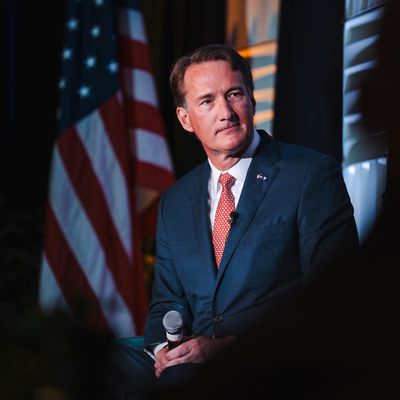
In the narrative that Donald Trump has developed surrounding this and past presidential elections, the myth of noncitizen voting looms large, casting big, scary shadows. Though we have no evidence of this happening in numbers significant enough to matter, it’s central to Trump’s wild but insistent claim that Joe Biden and Kamala Harris have opened the borders so that migrants can come in to vote illegally and displace legitimate American voters. And that claim, in turn, is looking like the most important preemptive rationale for the inevitable Trump challenge to an election defeat. Earlier this year, House Republicans, led by Trump’s vassal Speaker, Mike Johnson, reinforced the narrative by passing a redundant federal ban on noncitizen voting (it wass already illegal, with violators being subject to prison terms and deportation).
But is there anything Team Trump can do to give a bit more credibility to the bizarre tales of massive noncitizen voting that he’s been repeating since his 2016 campaign? Virginia’s Republican governor, Glenn Youngkin, seems to have found a way to raise suspicions without exposing himself to too much immediate refutation. In August, he ramped up an existing state system for identifying possible noncitizens who were added to voter rolls via the “motor voter” system, whereby 24 states automatically register people obtaining driver’s licenses. Because his executive order accelerating this system for flagging suspects was issued exactly 90 days before the 2024 election, it sure looked like Virginia was testing a provision of the national “motor voter” law imposing a 90-day “quiet period” before elections, during which states aren’t allowed to mess with registrations issued under the law.
Predictably, the Justice Department and voting-rights groups sued, and last week a federal judge agreed Youngkin had violated the “quiet period.” Now a three-judge panel of the Fourth Circuit Court of Appeals has affirmed the order halting the purge, as Politico reported:
The three-judge panel’s order stressed that Virginia officials “remain able to prevent noncitizens from voting by canceling registrations on an individualized basis or prosecuting any noncitizen who votes,” but said a system Virginia uses to match citizenship data from the Department of Motor Vehicles with voter rolls appears to violate the National Voter Registration Act of 1993 when implemented during the so-called “quiet period” before elections.
About 1,600 people were removed from Virginia voter rolls in the wake of an Aug. 7 executive order from Youngkin, according to court filings. It’s unclear how many were non-citizens, but at least some were citizens. Some may have re-registered. While non-citizens often make it onto voting rolls, it is illegal for them to cast ballots, and instances of them actually voting are extremely rare.
Youngkin has been careful to say he was “not suggesting there is widespread voter fraud,” but less-inhibited Trump allies don’t have any such compunctions, as NBC News reported: “Former President Donald Trump and House Speaker Mike Johnson and others praised Youngkin’s order, in tweets and retweets, saying he was keeping ‘illegals,’ ‘illegal aliens’ or ‘noncitizens’ from voting.” And now, as he probably expected all along, the Virginia governor is appealing the adverse judicial decisions to the U.S. Supreme Court, according to CBS News:
Virginia officials asked the Supreme Court to grant its request for emergency relief by Tuesday. They claimed that the district court’s order violates Virginia law “and common sense” and “mandates a variety of disruptive measures.”
The injunction issued by the lower court will harm “Virginia’s sovereignty, confuse her voters, overload her election machinery and administrators, and likely lead noncitizens to think they are permitted to vote, a criminal offense that will cancel the franchise of eligible voters,” state officials wrote.
This cynical cry for help against noncitizen registered voters who may actually be citizens and probably won’t even try to vote fits right into the Trump campaign’s heads-we-win, tails-you-lose strategy for disputing any adverse result on November 5. Perhaps the Supreme Court will give Youngkin a hearing on his complaints literally during the last week of the campaign. But if the Court (more likely) refuses to interfere with clearly established federal-election rules so late in the game, Trump will still get publicity airing allegations of noncitizen voting. It’s about the best a blue-state Republican governor can do to help his party’s boss. And if Trump eventually wins, Youngkin’s efforts might land him a nice Cabinet post or some other choice appointment, which could be handy since the term-limited Virginian will be looking for work at the end of 2025.
More on politics
- Trump Ambassador Picks: Who’s in His ‘Diplomatic Clown Car’
- What We Learned From the House Ethics Report on Matt Gaetz
- Everyone Biden Has Granted Presidential Pardons and Commutations






























